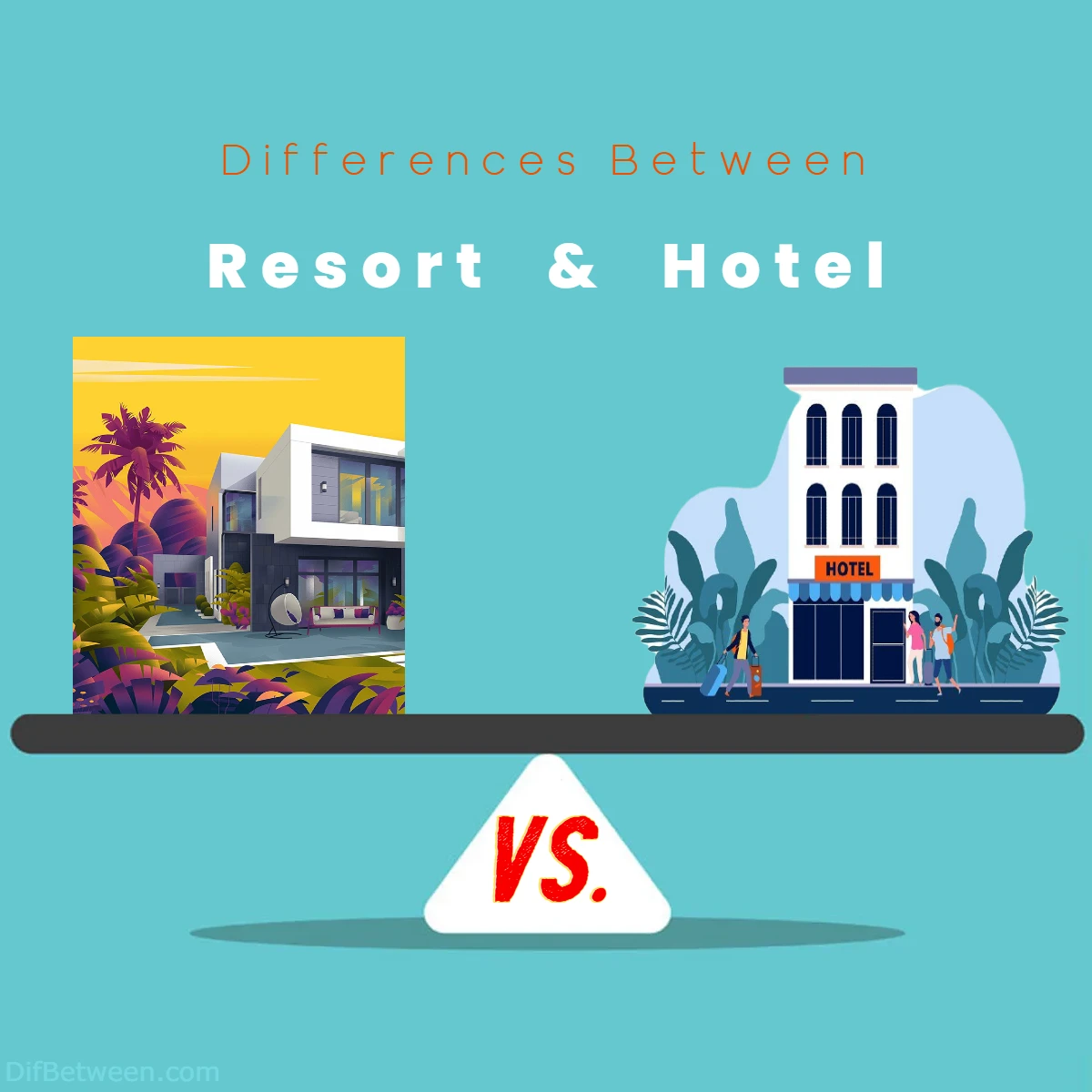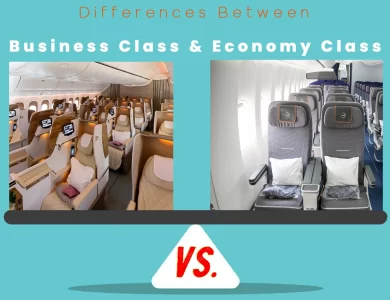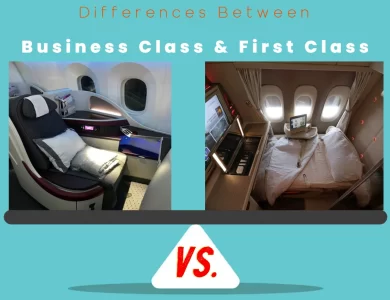
| Aspect | Resort | Hotel |
|---|---|---|
| Atmosphere | Relaxed, leisure-focused ambiance | Refined, business-oriented environment |
| Location | Natural landscapes (beaches, mountains) | Urban centers with easy access to attractions |
| Facilities | Extensive amenities, multiple activities | Basic to moderate amenities, fewer activities |
| Accommodation | Luxurious suites, private villas | Standard rooms to suites |
| Entertainment | Vibrant nightlife, themed events | Cozy and relaxed evening experiences |
| Dining | Multiple restaurants, thematic cuisine | On-site restaurants, varied cuisines |
| Target Audience | Families, couples, wellness seekers | Business travelers, tourists, families |
| Nature of Stay | Longer getaways, retreats | Versatile for short stays or longer trips |
| Service | Personalized attention, exclusive experiences | Efficient and diverse services |
| Cost | Generally higher due to all-inclusive amenities | Varied pricing options to suit budgets |
| Recreational Activities | Wide range of activities, water sports | Basic recreational facilities |
| Purpose of Stay | Leisure and relaxation, special occasions | Urban exploration, business ventures |
| Romantic Getaways | Ideal with private accommodations, intimate settings | Suitable with cozy atmosphere |
| Layout and Design | Elaborate architecture, themed decor | Functional layouts, varied aesthetics |
From the sun-kissed shores of resorts to the vibrant streets flanked by hotels, every traveler’s journey is a narrative of choice. With each decision, a tapestry of experiences is woven, shaping memories that linger for a lifetime. With amenities that pamper and atmospheres that enchant, resorts beckon travelers to a world of leisure and indulgence. Meanwhile, hotels stand as urban gateways, connecting you to the heartbeats of the cities they inhabit. But which path shall you tread? Fear not, for our compass is calibrated to guide you through the labyrinths of distinction.
Differences Between Resort and Hotel
Resorts and hotels offer distinct accommodation experiences. Resorts typically boast luxurious amenities, expansive grounds, and serene natural surroundings, providing an all-encompassing vacation with activities like water sports, spa treatments, and fine dining. In contrast, hotels focus on practical comfort, often located in urban centers for easy access to city attractions, catering to business travelers, families, and tourists with convenient facilities such as meeting rooms, restaurants, and comfortable rooms.
1. Atmosphere and Ambiance
Resort: Embracing Leisure and Luxury
Resorts are renowned for their immersive and relaxed ambiance that radiates tranquility and indulgence. They are designed with the intention of providing a comprehensive vacation experience within their premises. Nestled amidst picturesque landscapes, resorts often feature expansive grounds, lush gardens, and private beaches. These natural elements contribute to an enchanting atmosphere that encourages guests to unwind and disconnect from the stresses of everyday life.
The architecture and decor of resorts tend to be more elaborate and thematic, transporting guests to a world of luxury and leisure. Whether it’s a tropical paradise with thatched roofs and bamboo accents or a European-style haven with elegant facades, resorts spare no expense in creating a cohesive and captivating environment.
Hotel: Where Comfort Meets Convenience
Hotels, on the other hand, focus on providing comfortable accommodations with a touch of convenience. The ambiance of a hotel is generally more refined and business-oriented, catering to a diverse clientele that includes business travelers, families, and tourists. The emphasis here is on delivering a cozy and functional stay, rather than an all-encompassing vacation experience.
The architectural style of hotels can vary widely, ranging from sleek and contemporary designs to classic and understated aesthetics. The decor often reflects the local culture or the specific branding of the hotel chain. While some luxury hotels do offer a lavish atmosphere akin to resorts, most hotels provide a more straightforward setting that prioritizes rest and accessibility.
2. Location and Setting
Resort: Nature’s Haven
One of the standout features of resorts is their idyllic location in the midst of natural beauty. Resorts are frequently positioned in breathtaking locales such as tropical islands, mountainous regions, or coastal paradises. This prime positioning allows guests to immerse themselves in nature’s splendor while enjoying the convenience of luxurious amenities.
Resorts often boast expansive landscapes, sprawling golf courses, and even private access to pristine beaches. These natural surroundings lend themselves to a wide array of recreational activities such as water sports, hiking, and wellness retreats. Whether it’s the sound of waves crashing or the panoramic view of majestic mountains, resorts capitalize on the serene backdrop to create an unforgettable experience.
Hotel: Urban Accessibility
Hotels, on the other hand, tend to be situated in more urban and central locations. Their primary advantage lies in their accessibility to key city attractions, business centers, and cultural landmarks. This makes hotels an ideal choice for travelers who wish to explore the city’s offerings while having a comfortable base to return to.
While some hotels do offer stunning views of city skylines or waterfronts, their setting is generally more focused on providing a convenient starting point for various activities. This urban proximity allows guests to easily venture out for sightseeing, shopping, or attending business meetings, making hotels a practical choice for those with a packed itinerary.
3. Facilities and Activities
Resort: A Playground of Possibilities
One of the most distinguishing factors of resorts is the plethora of facilities and activities they offer within their expansive premises. Resorts are akin to self-contained worlds, aiming to provide everything a guest could desire without having to step outside. From multiple restaurants and bars to swimming pools, spas, and fitness centers, resorts are equipped to cater to every whim.
| Facilities | Activities |
|---|---|
| Multiple Restaurants | Water Sports |
| Spas and Wellness | Yoga and Meditation |
| Golf Courses | Nature Walks |
| Swimming Pools | Cooking Classes |
| Beach Access | Live Entertainment |
| Recreational Courts | Cultural Workshops |
The variety of activities at resorts is designed to cater to different age groups and interests, making them an ideal choice for family vacations, romantic getaways, or group retreats. Whether you’re looking to relax by the pool, indulge in a spa treatment, or engage in thrilling water sports, resorts have it all within arm’s reach.
Hotel: Essential Comforts
Hotels focus on providing essential comforts and conveniences without the extensive range of facilities found at resorts. While most hotels do offer amenities such as restaurants, fitness centers, and conference rooms, their scope is more limited compared to the extensive offerings of resorts.
| Facilities | Activities |
|---|---|
| On-Site Restaurants | Fitness Centers |
| Meeting Rooms | City Tours |
| Concierge Services | Cultural Events |
| Swimming Pools | Business Facilities |
| Spa Services | Live Music Events |
| Room Service | Workshops and Seminars |
Hotels are a practical choice for travelers who prioritize a comfortable place to rest after a day of exploring the city or attending business meetings. The focus here is on providing a home away from home, with the option to enjoy some basic recreational activities on-site.
4. Dining Experience
Resort: Gastronomic Journeys
Resorts are renowned for their diverse culinary offerings that tantalize the taste buds of guests. With multiple restaurants showcasing a variety of cuisines, guests at resorts can embark on a gastronomic journey without ever leaving the property. From fine dining establishments to casual beachside cafes, resorts aim to cater to every palate.
The emphasis on culinary excellence is often reflected in the quality of ingredients used, the creativity of the dishes, and the immersive dining environments. Resort chefs often engage in culinary events, cooking classes, and themed dinners, enhancing the overall dining experience.
Hotel: Culinary Comforts
Hotels also offer dining options, but their focus is more on providing convenient and comfortable eating experiences. Most hotels have at least one on-site restaurant that serves a range of dishes to cater to their diverse clientele. While the culinary offerings might not be as extensive as those of resorts, hotels do ensure that guests have access to quality meals without needing to venture far.
The dining experience at hotels is typically geared towards providing nourishment and a pleasant atmosphere, making them suitable for guests who prefer straightforward dining options during their stay.
5. Target Audience and Purpose of Stay
Resort: Leisure and Relaxation
Resorts are designed to be a haven for relaxation and leisure. They are especially appealing to travelers seeking an escape from their daily routines, with the desire to unwind in a luxurious setting. Families, honeymooners, and those in need of rejuvenation often gravitate towards resorts due to the comprehensive experience they offer. Resorts are also a popular choice for destination weddings and special occasions due to their picturesque backdrops and event planning services.
Hotel: Versatility and Functionality
Hotels, being more versatile in nature, cater to a wider range of travelers. Business travelers appreciate the convenience and amenities that hotels provide, such as meeting rooms, Wi-Fi connectivity, and efficient concierge services. Families and solo travelers also find hotels to be suitable options, especially when they plan to explore the city or engage in various activities beyond the accommodation.
6. Accommodation Options and Layout
Resort: Luxurious Abodes
Resorts often boast a wide range of accommodation options, from elegant suites to spacious villas and private bungalows. The design and layout of these accommodations prioritize comfort and luxury, featuring lavish furnishings, expansive living areas, and indulgent amenities. Many resorts also offer rooms with stunning views, whether it’s of the ocean, mountains, or lush gardens.
The focus here is on providing guests with a luxurious home away from home, often including private terraces, plunge pools, and outdoor lounging areas. This opulent setting makes resorts particularly appealing to couples seeking romantic getaways and travelers who want to experience a touch of lavish living.
Hotel: Functional and Practical
Hotels offer a variety of room types, ranging from standard rooms to suites, with varying levels of amenities and space. The emphasis is on providing functional and comfortable accommodations that cater to the needs of travelers without excessive extravagance. While luxury hotels do exist and offer lavish accommodations, most hotels prioritize practicality over opulence.
The layout of hotel rooms is typically designed to maximize space efficiency and functionality, with amenities like work desks, storage areas, and well-equipped bathrooms. Hotels are ideal for travelers who value a comfortable place to rest and recharge after a day of exploration or business activities.
7. Entertainment and Nightlife
Resort: Nights of Revelry
Resorts often shine after the sun sets, offering a vibrant nightlife experience for their guests. Many resorts have bars, lounges, and nightclubs that come alive with live music, themed parties, and entertainment shows. These venues provide guests with the opportunity to socialize, dance, and enjoy evenings filled with excitement and camaraderie.
In addition to traditional nightlife options, some resorts also organize cultural performances, outdoor movie screenings, and bonfires by the beach. These activities add an extra layer of enchantment to the resort experience, making evenings as memorable as the daytime adventures.
Hotel: Cozy and Relaxed Evenings
While hotels do offer bars and lounges for guests to unwind, the overall nightlife scene is often more relaxed and subdued compared to resorts. Hotel bars provide a comfortable space for guests to enjoy a drink and engage in conversations, creating an intimate and cozy atmosphere.
Hotels also organize occasional events such as wine tastings, live acoustic performances, and themed dinners. However, the emphasis is generally on providing a space where guests can wind down in a quieter and more tranquil setting, making hotels a great choice for those seeking a more laid-back evening experience.
8. Cost and Budget Considerations
Resort: Premium Pricing
Resorts are typically associated with higher price points due to their luxurious amenities, expansive facilities, and exclusive settings. The comprehensive vacation experience they offer often comes with a premium price tag, making them a choice for travelers who are willing to invest in a lavish escape.
The added cost of a resort stay covers not only the accommodation but also access to various recreational activities, dining options, and wellness facilities. It’s important to consider your budget and the value you place on the all-inclusive experience when opting for a resort.
Hotel: Varied Pricing
Hotels offer a wide range of pricing options, catering to different budgets and preferences. From budget-friendly options to luxury accommodations, hotels provide a variety of choices to suit the financial considerations of different travelers. Business travelers seeking practical amenities and families looking for comfortable stays can both find suitable options within the hotel category.
The pricing of hotels may vary based on factors such as location, room type, and the level of services provided. While luxury hotels can also be quite expensive, mid-range and budget hotels offer more affordable alternatives for travelers looking to minimize their expenses.
9. Duration of Stay
Resort: Longer Getaways
Resorts are often favored for longer vacations where guests can fully immerse themselves in the luxurious offerings and take advantage of the wide range of facilities and activities available. With their comprehensive amenities and diverse experiences, resorts are ideal for travelers who want to spend several days or even weeks enjoying everything the property has to offer.
Extended stays at resorts provide ample time to explore the surroundings, engage in multiple activities, and truly unwind without feeling rushed. Families, couples on honeymoons, and those seeking wellness retreats often find resorts to be the perfect setting for extended relaxation.
Hotel: Versatility for Any Duration
Hotels cater to a wide range of trip durations, making them suitable for short getaways as well as longer stays. Whether you’re on a weekend city break or a week-long business trip, hotels offer the convenience and comfort you need for various trip lengths.
Hotels provide a flexible environment where guests can easily tailor their stay to their specific needs. For travelers with limited time who want to explore the city’s attractions, a hotel provides a convenient base for efficient sightseeing. Similarly, for longer stays, hotels offer the essentials for a comfortable experience without the need for extensive on-site activities.
10. Service and Personalization
Resort: Elevated Service
Resorts often pride themselves on offering personalized and attentive service to their guests. With fewer rooms and a focus on creating a memorable experience, resort staff are often able to provide a higher level of attention to individual guests. From arranging private excursions to curating special celebrations, resorts excel in catering to the unique preferences and desires of their guests.
The intimate nature of the resort environment allows for deeper interactions between guests and staff, creating a sense of exclusivity and making guests feel truly valued and taken care of.
Hotel: Efficient and Diverse Service
Hotels, given their larger size and broader customer base, offer efficient and varied services to accommodate the needs of different guests. From business travelers with busy schedules to families with children, hotels are adept at providing a range of services that cater to diverse requirements.
While hotels may not offer the same level of personalized attention as resorts, they often excel in delivering prompt and professional service, ensuring that guests have a comfortable and hassle-free stay.
11. Travel Purpose and Activities
Resort: Retreat and Rejuvenation
Resorts are an excellent choice for travelers seeking a retreat from the hustle and bustle of daily life. They offer an opportunity to disconnect, recharge, and focus on wellness. Many resorts provide spa facilities, wellness programs, and holistic treatments that enable guests to embark on a journey of rejuvenation.
The serene natural surroundings and a slower pace of life at resorts make them conducive to activities such as yoga, meditation, and mindfulness. If your travel goal is centered around relaxation, self-care, and escaping the stresses of the modern world, a resort is likely the perfect fit.
Hotel: Exploration and Adventure
Hotels are well-suited for travelers with a more exploratory and adventurous spirit. Their central locations provide easy access to the city’s attractions, cultural sites, and local experiences. Hotels are a great choice for individuals and groups who want to immerse themselves in the local culture, try different cuisines, and explore historic landmarks.
Whether you’re interested in city tours, museum visits, or local markets, staying at a hotel allows you to engage with the destination and make the most of your travel experience.
Resort or Hotel: Which One is Right for You?
When it comes to planning a getaway, the age-old question arises: should you opt for a resort or a hotel? Each offers a distinct experience that caters to different types of travelers. Let’s take a closer look at the factors to consider when making this decision, helping you determine whether a resort or a hotel is the perfect fit for your upcoming adventure.
Seeking Relaxation or Urban Exploration?
If your goal is to unwind, escape, and immerse yourself in luxurious surroundings, a resort might be calling your name. Resorts are designed to provide a comprehensive vacation experience with extensive amenities, tranquil natural settings, and leisure-focused activities. They are ideal for honeymooners, families seeking quality time, and those in search of rejuvenation.
On the other hand, if your heart beats to the rhythm of the city and you’re excited about exploring local attractions, a hotel might be your preferred choice. Hotels offer convenience, central locations, and easy access to cultural landmarks, museums, and bustling city life. They cater to travelers who are keen to dive into the heart of a destination, making the most of their travel time.
Amenities Galore or Essential Comforts?
Are you enticed by the idea of a resort’s abundant amenities? Resorts boast everything from multiple restaurants and luxurious spas to golf courses and water sports. If you’re seeking a vacation where relaxation and activities are at your fingertips, a resort aligns with your desires. With breathtaking natural backdrops and entertainment options, resorts create a self-contained paradise for your enjoyment.
On the flip side, hotels offer essential comforts without the extensive range of amenities found at resorts. They provide the basics like cozy rooms, on-site restaurants, and fitness facilities, catering to the needs of travelers who are more focused on exploring the destination than staying within the confines of a property.
Romantic Retreat or Business Venture?
Are you planning a romantic escape or a destination wedding? Resorts often provide a dreamy backdrop for love to flourish, with private beaches, lush gardens, and elegant suites that set the stage for enchanting memories. They’re also perfect for special occasions and celebrations, making your moments even more extraordinary.
If your travel involves business meetings, conferences, or a packed itinerary, a hotel is your go-to option. With convenient city locations and efficient services, hotels cater to business travelers, providing meeting rooms, Wi-Fi connectivity, and easy access to corporate hubs.
Nature’s Embrace or City Lights?
Resorts embrace nature’s beauty with their stunning locations amidst mountains, beaches, and serene landscapes. They are designed for guests to connect with the outdoors, offering opportunities for hiking, water activities, and wellness retreats. If you’re drawn to the allure of nature and picturesque vistas, a resort will fulfill your yearning for natural splendor.
Hotels, on the other hand, place you right in the heart of the city’s excitement. Whether it’s the skyline from your room or the vibrant streets outside, hotels let you experience the energy of urban life. They’re ideal for those who wish to immerse themselves in local culture, exploring markets, museums, and bustling neighborhoods.
Personalized Attention or Versatile Service?
Are you looking for personalized attention and a tailor-made experience? Resorts excel in offering attentive service, often catering to individual preferences and arranging special experiences. The intimate atmosphere allows for deeper interactions between staff and guests, ensuring you feel pampered and cherished throughout your stay.
Hotels offer versatile services to cater to a diverse range of travelers. While personalized attention might not be as extensive as at resorts, hotels provide prompt and professional service. They focus on delivering comfort, convenience, and efficiency, accommodating various needs and preferences.
In the End, Your Choice Matters
Whether you lean toward the pampering luxury of a resort or the vibrant charm of a hotel, your choice will shape the memories you create on your journey. Consider your travel style, preferences, and the type of experience you want to have. Ultimately, both resorts and hotels have their unique charms, ensuring that your vacation is filled with moments you’ll treasure for years to come.
FAQs
The primary difference lies in the overall experience they offer. Resorts provide a comprehensive vacation with extensive amenities, often located in picturesque landscapes, while hotels focus on comfortable accommodations, typically situated in urban centers for easy access to city attractions.
Yes, resorts generally come with a higher price tag due to their luxurious amenities and all-inclusive offerings. Hotels offer a wider range of pricing options, making them suitable for various budgets.
Resorts are perfect for leisure getaways, offering relaxation and activities within their premises. Hotels are better suited for urban exploration, providing convenient access to city attractions and cultural experiences.
While some luxury hotels can match the opulence of resorts, most hotels prioritize essential comforts and practicality over the extensive range of amenities found at resorts.
Resorts cater to travelers seeking relaxation, romance, and wellness retreats. Hotels cater to a wider range, including business travelers, families, and tourists interested in exploring city attractions.
While many resorts are located in picturesque settings like beaches and mountains, they can also be found in various destinations around the world. Hotels are more versatile in terms of location, often situated in city centers.
Resorts are well-suited for family vacations, offering a variety of activities and amenities for all ages. Hotels also cater to families, but their focus might be more on providing comfortable accommodations and easy access to family-friendly attractions.
While hotels may not offer the same level of personalized attention as resorts, many provide efficient and diverse services to cater to the needs of different guests.
Yes, resorts often have a wider range of recreational activities due to their expansive grounds and amenities. Hotels offer basic recreational facilities but may not match the variety of activities found at resorts.
Resorts are often chosen for romantic getaways due to their luxurious settings, private accommodations, and opportunities for intimate experiences like couples’ massages and candlelit dinners.
Read More:
Contents
- Differences Between Resort and Hotel
- 1. Atmosphere and Ambiance
- 2. Location and Setting
- 3. Facilities and Activities
- 4. Dining Experience
- 5. Target Audience and Purpose of Stay
- 6. Accommodation Options and Layout
- 7. Entertainment and Nightlife
- 8. Cost and Budget Considerations
- 9. Duration of Stay
- 10. Service and Personalization
- 11. Travel Purpose and Activities
- Resort or Hotel: Which One is Right for You?
- FAQs






